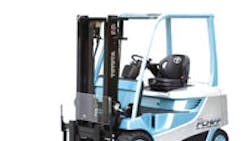Fuel cell-powered lift trucks will become an earlier sign of the hydrogen economy than automobiles, predicts Battelle researcher Kathya Mahadevan. Contributing factors to that development include performance advantages and hydrogen refueling that's simpler and faster than recharging a battery-powered lift truck, says the Columbus, Ohio-based researcher.
During a fuel cell study commissioned by the U.S. Department of Energy, Mahadevan documented substantial levels of user dissatisfaction with battery maintenance issues in heavy-use applications such as high throughput retail distribution centers. "They are also unhappy with such things as battery weight, danger of acid spills and the amount of time needed for battery swaps."
As a result, numerous fuel cell field trials are underway where lift truck makers and fuel cell providers are collaborating to demonstrate the technology's potential. In Canada, for instance, Hydrogenics Corp. helped conduct trials at General Motors of Canada's car assembly plant in Oshawa, Ontario, at FedEx Canada"s logistic hub and at Toronto International Airport.
In the United States, retail giant Wal-Mart concluded the first phase of its fuel cell trial, in a collaboration with lift truck vendor Crown Equipment Co. and Cellex Power Products Inc., the fuel cell power solutions vendor recently acquired by Plug Power Inc.
Mahadevan's research positions fuel cell-powered lift trucks in a strong supporting role on the pathway to fuel cell automobiles, with proton exchange membrane (PEM) technology cited as the most marketable approach for lift truck fuel cell systems.
Battelle's analysis says PEM technology provides notable value over battery-powered forklifts in high productivity environments. The study's conclusion: Forklifts under conditions of near continuous use are significantly less expensive than similar battery-powered systems from a lifecycle cost perspective.
With PEM fuel cells, the study cites the advantages of rapid refueling, elimination of the time and cost of replacing batteries, constant voltage delivery, increased productivity by eliminating battery recharging time, fewer repairs due to fewer moving parts and elimination of battery storage/changing rooms.
Battelle's study also recommends efforts to maintain fuel cell competitiveness as battery-powered approaches improve. For example, fast-charging concepts are already eliminating the need for battery charging rooms.
The study sees lift truck applications a key to future fuel cell proliferation, stating: "It is also likely that the PEM fuel cells developed for forklifts will be a platform that can be used broadly as battery replacements in other material handling equipment such as automatic guided vehicles, other industrial equipment and ground support equipment."
See Also
